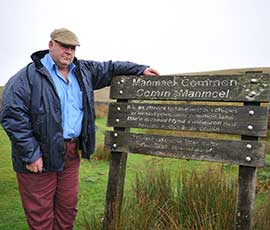Farmer speaks out over fly grazing

A Welsh farmer has spoken out about the growing problem of horse abandonment which has robbed him of grazing for his cattle and sheep.
So called fly-grazing has been a problem for more than a decade on William Jenkins’ farm near Manmoel Common in the heart of the South Wales valleys.
Mr Jenkins relies on common land grazing to feed his stock in the spring and more so than ever this year.
But when Mr Jenkins turned his flock on to the common in May after one of the harshest winters he can recall there was little grass to be grazed because the grass had already been eaten by dozens of abandoned ponies.
Unsurprisingly, many of those horses had already perished in prolonged freezing conditions, dying either of starvation or exposure.
Fly grazing has been an issue on Manmoel Common near Ebbw Vale for more than 10 years, robbing farmers with historic rights to graze that common of an important food source for their livestock. “There can be 50 or 60 ponies on there at any one time,” said Mr Jenkins, who runs a beef and sheep farm at Blackwood. “In October I gather the sheep off the hill and bring them back to the farm until the following May. Last spring we had a situation where there was no grass to turn the animals on to.”
The problem has increased as the value of horses has plummeted and until now farmers like Mr Jenkins have felt powerless.
“Farmers can advertise a horse and sell it after 14 days to cover their costs but if a pony has no passport or microchip that animal can’t be sold. It would cost a farmer more to get the passport and microchip than the horse is worth,” he explained.
“Large numbers of horses can appear in a field overnight and by the time the farmer has gone through the correct channels the horses have been removed but by then the damage has been done.”
William Jenkins, South Wales farmer
Mr Jenkins has also had ponies turned into his fields, although he said this problem is greater on farms near to large towns and cities along the M4 corridor in south Wales.
“Large numbers of horses can appear in a field overnight and by the time the farmer has gone through the correct channels the horses have been removed but by then the damage has been done,” Mr Jenkins explained. “The people who own the horses know the law and know how to get away with it. I know of farmers with fields of corn just ripening or grass they have been about to mow and they find there are 30 horses in there.
“The farmer is often stuck with those horses for two to three weeks before they can do anything about it. We have this problem on the odd occasion.”
But the situation is about to change. Wales is taking the lead by introducing new legislation through the Control of Horses (Wales) Bill to give all local authorities the power to seize and ultimately destroy abandoned horses.
The Welsh government aims to fast track the Bill through the National Assembly of Wales and, once in place, the legislation will allow for early and swift intervention when horses are abandoned or left on land without consent.
Mr Jenkins applauded the Welsh government’s approach. “I think the new legislation will go a long way to help stop the problem, it will make people think twice about fly grazing. The legislation is not perfect, a lot more could be done, but it is a step in the right direction and something we can work off moving forward.”
Mr Jenkins came forward as the horse abandonment issue hit the headlines.
Princess Anne, speaking in her capacity as president of the World Horse Welfare charity at a conference in London on 14 November, suggested the problem could be alleviated by the introduction of a horsemeat market in the UK.
The Princess Royal said animals would get better treatment if they were destined for the meat market at the end of their lives.
